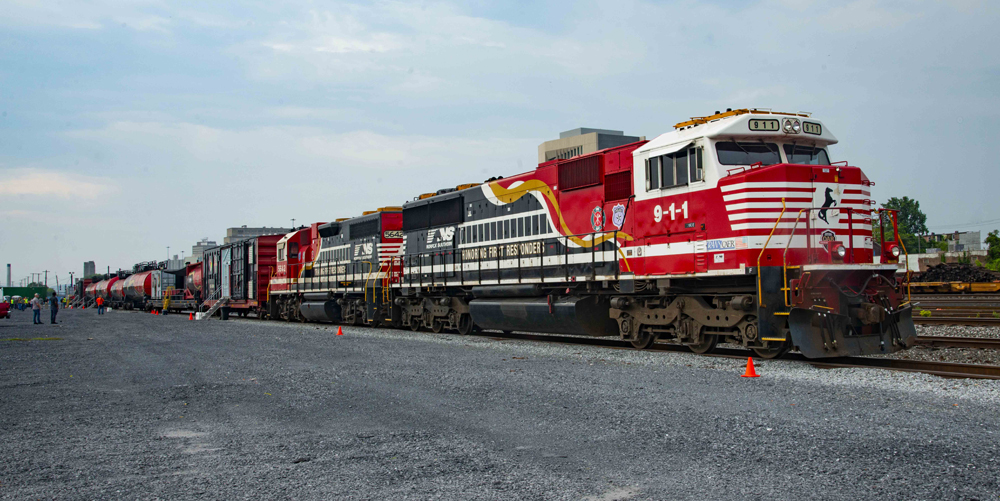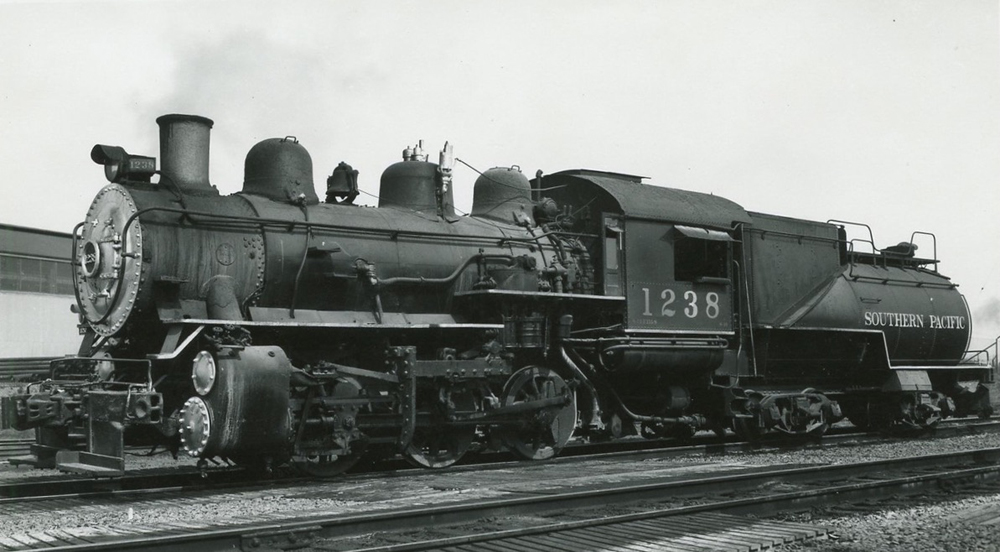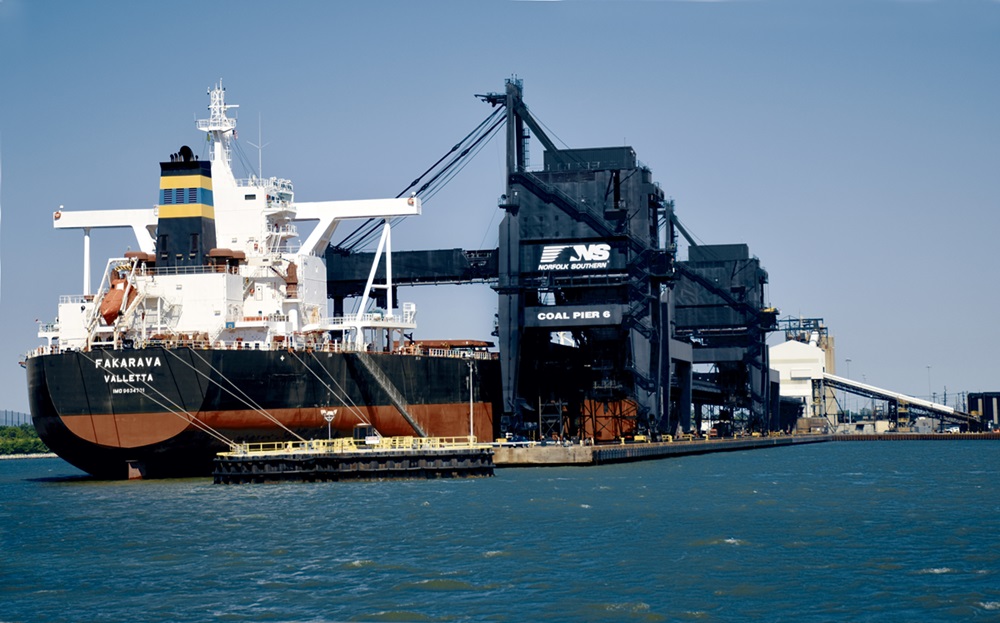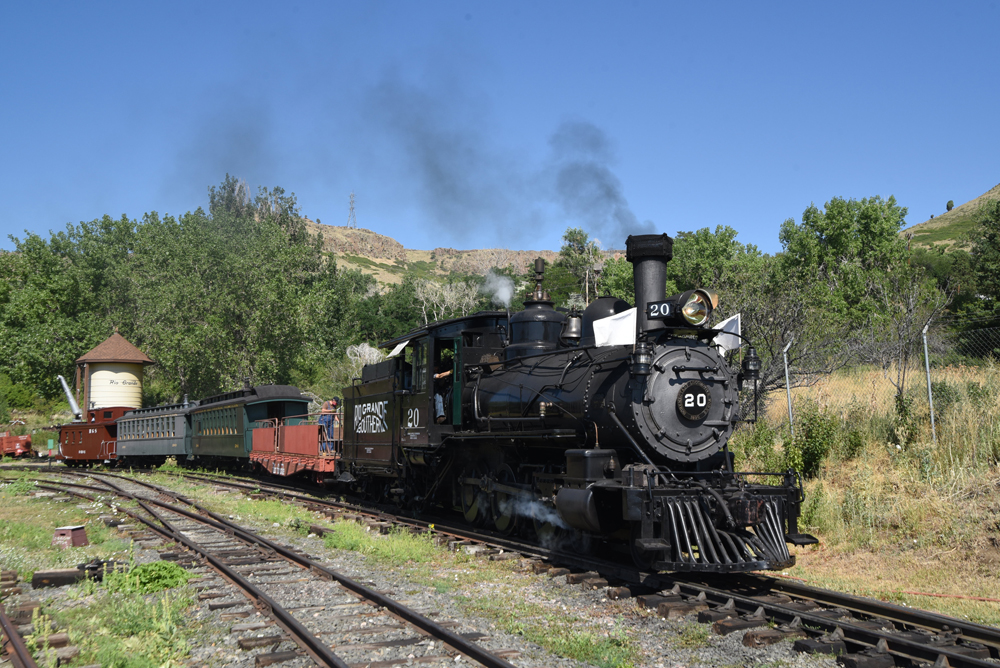
In a significant boost to activist investor Ancora Holdings, one of the two major proxy advisory firms has recommended that Norfolk Southern shareholders vote in favor of six of its seven dissident board candidates.
Glass Lewis made the recommendation in a report issued on Sunday, which concludes that Ancora has made a compelling case that NS has underperformed and that the activist investor’s plans would likely result in a better outcome for shareholders.

Major institutional shareholders who attempt to mirror the broader stock market — passive investment fund companies such as Vanguard, State Street, and Black Rock, who collectively hold a large portion corporations’ shares — typically follow proxy advisory firm recommendations. Institutional Shareholder Services, the larger of the two advisory firms, has yet to issue its recommendation on how NS investors should vote at the company’s May 9 annual meeting.
Ancora’s CEO candidate, former UPS executive Jim Barber Jr., was among the board candidates to earn Glass Lewis’s recommendation. The only Ancora candidate Glass Lewis did not endorse was former Ohio Gov. John Kasich, who the company said does not have the necessary expertise or experience to sit on the board.
If shareholders follow Glass Lewis’s endorsements, Ancora would be left one seat short of a majority on Norfolk Southern’s 13-member board. Nonetheless, Ancora welcomed the Glass Lewis report.
“We appreciate that Glass Lewis has conducted an extremely thoughtful and thorough analysis of Norfolk Southern, resulting in a recommendation for six of our unaffiliated and qualified director candidates, including proposed CEO Jim Barber,” Ancora CEO Frederick D. DiSanto and Ancora Alternatives President James Chadwick said in a statement this morning.
“Glass Lewis affirms our view that several tenured insiders, including Chair Amy Miles, Director Claude Mongeau and CEO Alan Shaw, should be immediately replaced due to their apparent responsibility for sustained underperformance,” they said. “Additionally, the firm’s report accurately diagnoses that the Board and Mr. Shaw are committed to an unproven strategy ‘that relies on inherently incompatible railroading concepts.’ Lastly, the report highlights the Board’s recent string of reactive moves, including the decision to provide financial and strategic consideration to a competitor – without a shareholder vote – in order to hire an operating executive during a contest. Although we believe the only way to ensure a change in CEO and shift in strategy is to elect our full slate, this recommendation from Glass Lewis sends an important message to shareholders about the urgent need for changes in leadership and strategy at Norfolk Southern.”
Shaw, in an interview today with The Associated Press, vowed to fight on until the shareholder meeting next week.
“The choice really couldn’t be any more clear for our shareholders,” Shaw said. “We make promises and we’ve continued to keep our promises, and we will continue to deliver. And we’ve got a long-term vision for Norfolk Southern where shareholders win, as opposed to the activists who’ve got a short-term and erratic approach where shareholders lose.”
In its report, Glass Lewis notes that Norfolk Southern’s operating ratio has been last or second to last among the Class I railroads for the past seven years, and that NS has consistently underperformed Eastern rival CSX in terms of revenue per carload and container, revenue growth, and return on invested capital.
“Considering our findings, we are inclined to agree with Ancora’s argument that management’s shift from merchandise to intermodal may have adversely impacted the Company’s profitability, and that recapturing merchandise volume should be a priority for the Company,” Glass Lewis said.
Glass Lewis said it believes that Barber and Ancora chief operating officer candidate Jamie Boychuk have “compelling credentials and track records.”
The report acknowledges the financial and operational toll the 2023 hazardous materials derailment in East Palestine, Ohio, had on Norfolk Southern. But it says that changes Shaw has made recently, including hiring former Canadian National and Canadian Pacific Kansas City executive John Orr as chief operating officer, were too little, too late.
“We recognize the Company was dealt a difficult hand recently, as the East Palestine derailment almost certainly delayed much of the progress the Company might have made in its attempts to implement its strategy and show positive results to investors,” Glass Lewis says. “Still, the derailment does not explain the consistent performance gap between the Company and its Class I peers in prior years. Put another way, it’s not readily evident to us the Company’s current leadership had built up a sufficiently positive track record such that investors might reasonably have the patience to allow management to implement a relatively novel operating strategy.”
Glass Lewis disagreed with Norfolk Southern’s contention that Ancora plans to make “slash-and-burn” changes that would cut costs and boost profits at the railroad.
“Considering that railroad safety is currently at the forefront of the minds of various key stakeholders, we believe a ‘slash-and-burn’ approach would likely be untenable, as such a move could invite greater regulatory scrutiny and generate momentum for potentially more onerous industry regulation,” Glass Lewis concludes. “We believe Ancora likely understands this line of thinking, as it has not called for any draconian cost cuts and, instead, has made safety a stated priority.”
Ancora has said that its proposed management team would improve NS operations, service, and profitability by jettisoning Shaw’s resilience strategy and fully implementing the low-cost Precision Scheduled Railroading operating model.
Ancora Holdings says its plan for NS would cut costs, focus on the most profitable merchandise traffic, and produce a 57% operating ratio within three years. That would be a 10.4-point improvement over Norfolk Southern’s 2023 operating ratio.
Ancora says its plan would rely on attrition – not layoffs – to reduce employment levels at NS.
Independent analyst Anthony B. Hatch says the Glass Lewis recommendation is a blow to Norfolk Southern’s current management team. “But the game is still on,” he says. “It’s clearly going to be close.”
If Ancora is unable to gain a majority on the board, it may be possible that Shaw and Orr will be given additional time to improve the railroad’s operations and earnings, Hatch says.
The proxy advisory firm recommendations are closely followed by the passive investment funds that do not engage with the managements of the companies they invest in, Hatch says. But actively managed investment funds, who have their own analysts, will determine how to vote based on their own research and determinations of what’s in the best interest of shareholders, he says.
Hatch was critical of some of the conclusions that Glass Lewis reached, including its recommendation that shareholders vote against NS board member Claude Mongeau, who was the highly regarded CEO at Canadian National when its growth began to take off.
“To say no to Claude Mongeau is moronic. The guy is one of the two or three living superstars of the industry,” Hatch says.
Hatch also took issue with Glass Lewis agreeing with Ancora’s contention that Norfolk Southern’s traffic mix is too heavily tilted in favor of lower-margin intermodal business. “That shows you the problem of non-rail folks having such outsized influence on votes affecting the railroad because that position is ridiculous,” Hatch says.
Intermodal has been the industry’s growth engine, Hatch notes, and carload business has been in decline, particularly in the East. “It has been clear for 20 years, even with reshoring and nearshoring, that intermodal is still the critical growth element for the railroads. And it has to be,” Hatch says. “The big capital expense has already been done in terms of corridor development and terminals.”
And with railroads no longer running near capacity, there’s no longer an argument that intermodal is in the way of higher-margin bulk and merchandise traffic.
Note: Updated at 7:18 a.m. Central with additional detail from Glass Lewis report and at 10:35 a.m. with comment from analyst Anthony B. Hatch. Updated at 4:24 p.m. Central with comment from Alan Shaw.














Merchandise traffic appears strong absent economic times. Most rolling stock is now custom designed to carry specific goods, something trucks rarely offer. Plus the volume of raw materials, steel, chemicals etc moves best by rail. If RR can reduce dwell time this will only improve.
I’ve noted before that I’d like to have seen how the Barber Boychuck show would have handled East Palestine. My guess is they’d throw a few pennies off of a moving train passing through the community and that would be it, leaving the reputation of the freight rail industry worse than it is. It’s easy to criticize from the cheap seats. One day, professional historians will tell the East Palestine story and Ancora’s arguments will wither on the vine like like roses in the desert.
…and one more…
This is just another huge distraction from doing the real work of being a forward focuses business. Thankfully BNSF has stable ownership. They are going to have to show the way.
Hatch is 150% correct.
I’d go farther. I’d say merchandise is in the way of intermodal…
Railroads have to become intermodal railroads that figure out how to fit in merchandise traffic.
Railroads that emphasize merchandise will be nearly dead in 20 years.
Emphasizing merchandise over intermodal is a going out of business strategy. Bleed out cash until the franchise whithers and dies.
https://blerfblog.blogspot.com/2023/12/how-to-kill-rail-renaissance-and-maybe.html?m=1
Taske it down to the studs? Well that will later years require a bail out by the US government. What should happen is that when the US bails out NS everyone who benefited will have to refund at least their benefit or maybe more. Will take a law probably?
Of course a proxy firm would recommend a vote for Ancora. Proxy firms are made up of the same people who work with the hedge funds. They push a vote to get short term gain, make their institutional voters happy and renew their services.
1. Not a particularly logical conclusion: Glass -Lewis says that slash and burn would be an untenable strategy but yet Ancora has said that it intends to cut NS to its studs. Cutting NS to its studs would indeed be draconian cost cuts, which Glass-Lewis allegedly deplores.
2. It is sad that Glass-Lewis believes that putting service before minimum staffing levels would be novel.